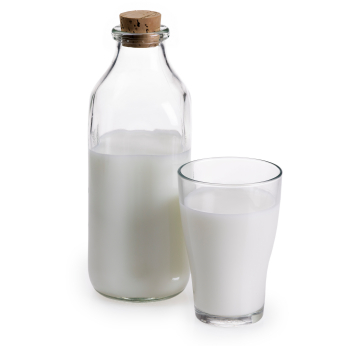 Don’t cry over raw milk. The Farm-to-Consumer Legal Defense Fund is taking on the Big Enchilada in the raw milk war: the U.S. Food and Drug Administration’s prohibition on interstate shipment of raw milk.
Don’t cry over raw milk. The Farm-to-Consumer Legal Defense Fund is taking on the Big Enchilada in the raw milk war: the U.S. Food and Drug Administration’s prohibition on interstate shipment of raw milk.
The FTCLDF filed suit over the weekend in U.S. District court against FDA commissioner Margaret Hamburg, and the secretary of the FDA’s parent agency, Health and Human Services, Kathleen Sebelius, challenging the constitutionality of the agency’s prohibition, enacted in 1987. It filed the suit on behalf of consumers and a farmer from six different states; the consumers all travel from states where raw milk sales are illegal to buy it in states where it’s allowed for sale and the farmer sells to out-of-state consumers.
The suit is notable for seeking to shift the focus of the interstate raw milk prohibition to consumers from farmers, where the FDA has focused its efforts, most notably in prosecuting the largest raw dairy in the country, Organic Pastures Dairy Co. in California, for selling milk outside its home state. The agency was behind a criminal case against the dairy, which ended with a guilty plea last year and an agreement by the dairy to confine its sales to California, and a civil case, which is still pending. The agency has also been active behind the scenes in urging crackdowns on raw milk in Michigan, Ohio, Wisconsin, Pennsylvania, and New York, among other states.
The case is also notable for the FTCLDF, which was formed less than three years ago to counter an aggressive FDA-led campaign against raw milk producers that began in 2006. While the legal organization has filed suits against state agriculture officials on behalf of raw dairy farmers in New York, Wisconsin, and California, as well as a suit against the U.S. Department of Agriculture on behalf of farmers affected by the National Animal Identification System (NAIS), this is its first encounter with the FDA, and as such, definitely the biggest case in its brief history.
All the consumer plaintiffs in the suit live in states where raw milk sales are prohibited–New Jersey, Iowa, North Carolina, and Georgia. The suit says the consumers buy their milk in neighboring states where raw milk is legal, and are being forced to break the law each time they travel back home with their milk.
The suit charges that “all Plaintiffs are being deprived of their fundamental and inalienable rights of (a) traveling across State lines with raw dairy products legally obtained and possessed; (b) providing for the care and well being of themselves and their families, including their children; and (c) producing, obtaining and consuming the foods of choice for themselves and their families, including their children.”
At stake, it says, are “the Constitutional Right to Travel; the Constitutional Right of Privacy; the substantive due process clause of the Fifth Amendment of the United States Constitution; Article 1, Section 1 of the United States Constitution (the Separation of Powers/Non-delegation doctrine) … “
According to Gary Cox, the lawyer for the FTCLDF, “This case challenges the legality of the FDA rule that bans the interstate distribution of raw milk in final package form for human consumption. It also challenges the legality of FDA’s ‘standard of identify’ for milk which requires that all milk needs to be pasteurized.”
Ironically, the FDA was dragged kicking and screaming back in the 1970s and 1980s into its current role of policing the transport of raw milk across state lines. It resisted the efforts of consumer groups to involve the agency-feeling the matter was a local issue-until a federal judge in 1987 responded to a consumer group suit by ordering the agency to draft regulations about the interstate shipment of raw milk. Since then, it has shifted from reluctant participant to aggressive enforcer and warning source against raw milk consumption. Its dairy chief, John Sheehan, is famous for his line, “Consuming raw milk is like playing Russian roulette with your health.”
The FTCLDF suit argues that the FDA’s role is a problem on several levels:
- It maintains that raw milk isn’t dangerous in the food-borne-illness scheme of things. “According to CDC statistics for 2007, there were 7,031 reported cases of foodborne outbreaks associated with bacteria, which resulted in 678 hospitalizations and 11 deaths (3 deaths of which were from pasteurized milk). According to those same CDC statistics for 2007, there were only 32 reported cases of illnesses attributed to fresh, unprocessed, raw milk (0.5 percent); there were only 2 reported hospitalizations attributed to fresh, unprocessed, raw milk (0.3 percent); and there were no reported deaths attributed to raw milk.” It concludes: “More people are killed each year from lightning strikes on golf courses than die from milkborne illnesses.”
- That consumers who cross state lines with raw milk could at any time be penalized for violating the FDA’s prohibition, even though the agency has generally limited itself to going after farmers. It points to a case last October, in which one of the plaintiffs, Eric Wagoner, who runs a Georgia food buying group over the Internet, had 110 gallons of raw milk already purchased by Georgia consumers confiscated because the milk had been purchased in South Carolina, where raw milk sales are legal, and brought back to Georgia, where they aren’t. “Upon reaching Georgia, Plaintiff Wagoner’s truck was searched and seized by officials from Georgia without a warrant. The raw milk in Wagoner’s truck was embargoed by officials from Georgia without a warrant. On Oct. 19, 2009, the 110 gallons of raw milk, including milk owned by Plaintiffs Wagoner and Cooper, were destroyed at the order of the Georgia officials and the FDA without a warrant or other legal process.”
- That the FDA, if it so chose, could take a less harsh approach to raw milk. “For example, FDA has a regulation at 21 C.F.R. 101.17 that pertains to unpasteurized juices, and provides, in part, that a warning label on a juice container is an acceptable alternative to pasteurizing the juice, to wit: ‘WARNING: This product has not been pasteurized and, therefore, may contain harmful bacteria that can cause serious illness in children, the elderly, and persons with weakened immune systems.'”
- That the FDA is singling out raw milk for special harsh treatment. According to the suit, “There is nothing in the PHSA [Public Health Service Act] that authorizes the FDA to find that a product that is legal to sell in more than half the States and where it is legal to consume in all 50 States should be banned as a ‘communicable disease’ or ‘illness’ particularly when there are other foods in the United States that cause more cases of foodborne illness.”
The FDA has been adamant in refusing to debate or otherwise discuss the matter of raw milk’s safety, limiting its views to a PowerPoint presentation on its site and to occasional written testimony in opposition to state legislation that might relax restriction on sales of raw milk. It seems safe to say that the agency will take the same approach to the suit-seek to avoid debate or discussion for as long as it can under judicial procedures.



